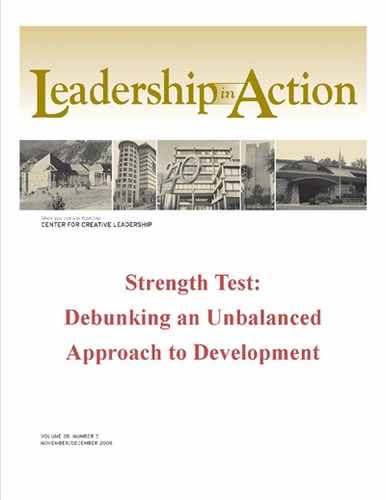A Resource for Avoiding the Traps
This article draws on the ideas presented at a recent meeting of the Society for Industrial and Organizational Psychology. To learn more about these ideas, see The Perils of Accentuating the Positive, edited by Robert B. Kaiser (Hogan Press, 2008). This book pulls together some of the leadership field's most respected authorities (many of whose views are outlined in this article) to share big ideas with a clear line of sight to practical applications for helping managers avoid the traps and hidden dangers of exclusively strengths-based development.
The idea of strengths-based development was introduced to a wide audience with the publishing of Now, Discover Your Strengths (Free Press, 2001), by Marcus Buckingham and Donald O. Clifton. Based on research by the Gallup Organization on leaders, managers, and workplaces around the world (Buckingham spent seventeen years as a senior researcher at Gallup before starting his own consulting and training company; Clifton was chairman of the Gallup International Research and Education Center before his death in 2003), the book describes thirty-four positive talent and aptitude themes and explains how to build what the authors call a “strengths-based organization” by capitalizing on these themes as they already exist among those who work in the organization.
Since the publication of Now, Discover Your Strengths, the notion of strengths-based development has taken off, largely through its promotion to the business world by a few companies with a significant commercial interest in the approach. The effectiveness and reach of the promotion campaign are evident from the flood of strengths-based volumes found in bookstores and on management best-seller lists, and from the fact that many managers and development professionals have completely bought into the strengths-based approach, fervently believing that strengths are all managers need. Even the mainstream press has jumped on the bandwagon; a column by Dan Cullen in the Money section of the February 12, 2001, edition of USA Today, for instance, stated that “excellence comes from maximizing strengths, never by fixing weaknesses.”
It's not difficult to understand the appeal of the strengths-based-devel-opment approach. It appears to let managers off the hook for their shortcomings and say, “That's OK, don't worry about those problems.”
Managers are encouraged to instead focus on what they are best at and most like to do—what comes naturally and is personally enjoyable.
We believe that although it is important to work on strengths in development, a note of caution must be sounded to temper the hype that has arisen around strengths-based development and to call attention to the hidden dangers that are glossed over by some of the approach's proponents. We further believe that a more balanced approach to developing leaders—one that is more practical and, not insignificantly, much more likely to enhance organizational performance—is preferable.
